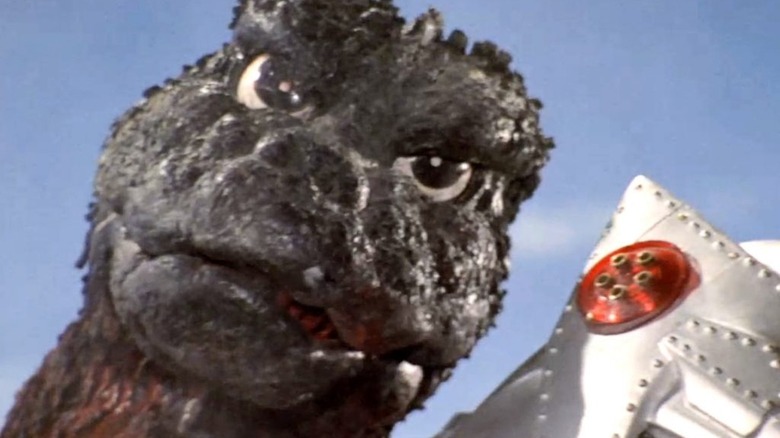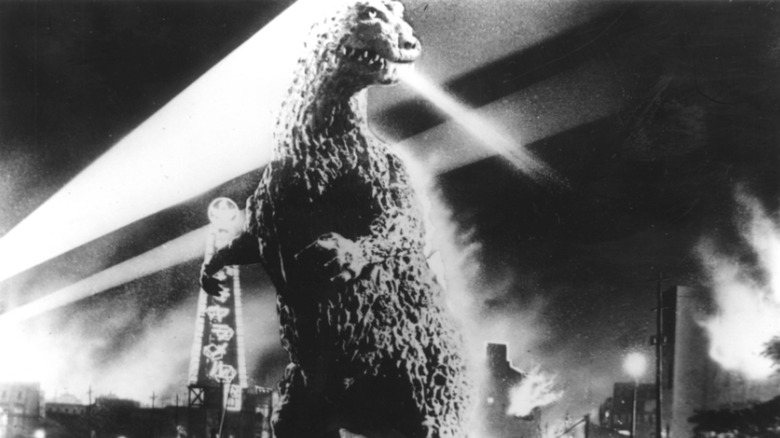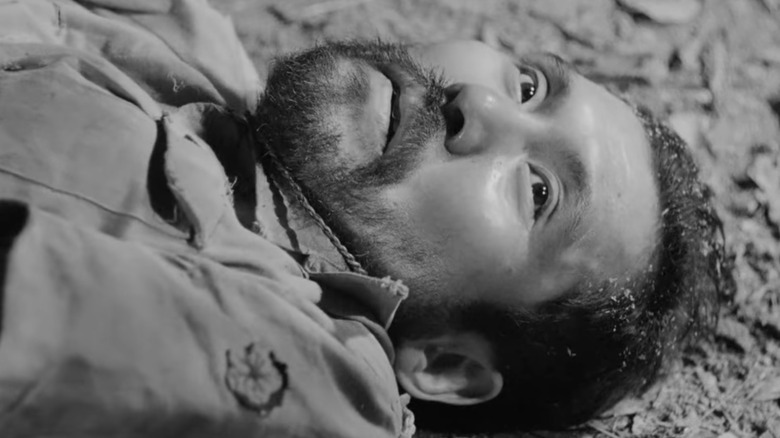Godzilla's Terrifying Name Might Have Had A Not-So-Terrifying Origin
Whether you refer to it as Godzilla or Gojira, Toho's monstrous creature is able to stir fear in the hearts of many just by mentioning its name alone. After all, who wouldn't be intimidated by a massive lizard-like creature with atomic breath? Even when ignoring the poignant anti-war and anti-nuclear weapon messaging that was essential in developing Godzilla as a character, the beast is one scary SOB, and you certainly wouldn't want your city to be the subject of his ire.
Although the creature has firmly established itself as the most well-known kaiju in the world, its name actually has a pretty funny origin legend. We call it a legend for reasons you will soon find out, but Godzilla is not its original name. Rather, it's the American anglicization of Gojira, itself a portmanteau of gorilla and the Japanese term for whale, kujira. I suppose that if you squint, that is what he sort of looks like, but that isn't even half of the story behind the fierce monster's name.
Fact or fiction?
The most detailed version of this legend comes from "Japan's Favorite Mon-star: The Unauthorized Biography of 'The Big G'" by Steve Ryfle. However, the original 1954 film's director, Ishiro Honda, and producer Tomoyuki Tanaka are claimed to have revealed the real-life inspiration for Godzilla and his name: a Toho Studios employee. See, the two claimed on separate occasions that there was a man with a very large and prominent physique working on Toho's soundstages when "Gojira" was in development.
"There was a big — I mean huge — fellow working in Toho's publicity department and other employees would say, 'That guy's as big as a gorilla,' [and] 'No, he's almost as big as a kujira,'" recalled Honda. "Over time, the two mixed, and he was nicknamed 'Gojira.'"
The thing is, Ryfle's book claims that Tanaka had referred to the fabled man as a backlot stagehand, not a publicist. Furthermore, these anecdotes were the only record of this man's existence for decades — he had not been identified by either name or face, and considering how well-documented the production of "Gojira" was, it seems strange that this mysterious employee has never been tracked down.
"I expect [the monster's] name was thought up after very careful discussions between Mr. Tanaka, Mr. [Eij] Tsuburaya [the special effects artist responsible for creating Gojira's design], and my husband," recounted Kimi Honda, the director's widow. "The backstage boys at Toho loved to joke around with tall stories, but I don't believe that one."
A glimmer of truth
However, there is a chance that the human "Gojira" may have actually been real — at least, if an unnamed Japanese television special from 2003 is to be believed. Classic Media had rereleased the original film that year on DVD, with a commentary between Ryfle and Ed Godziszewski included as a special feature.
"In 2003, a Japanese television program claimed to have identified this man as an actor named Shirô Amikura," said Ryfle. "He was a bit player, a contract actor in the 50s."
However, this doesn't necessarily mean that the myth has been confirmed to be real. Ryfle went on to say that it is still very likely that the man allegedly known as Shirô Amikura was just made up as a joke. "It's hard to believe the man that Godzilla was named after could have remained anonymous for fifty years, almost," he remarked.
For what it's worth, there was indeed an actor called Shirô Amakusa who fits the "bit player" description mentioned by Ryfle, and who was credited as Shirô Amikura in the 1953 film "Anatahan" (pictured above), which was also distributed by Toho. But while Amikura is of a slightly larger build than the rest of the cast, he's certainly not large enough to be compared to a gorilla or whale, so if anything his existence pokes a hole in this particular theory.
If we're being honest, I hope we never know for certain if this story is real. It's one of those urban legends that is just too charming to completely write off as false. I would also lose one of the facts I pull on unsuspecting people just to see what their reaction would be if it were proven untrue, so I'd like to avoid that, thank you very much.


